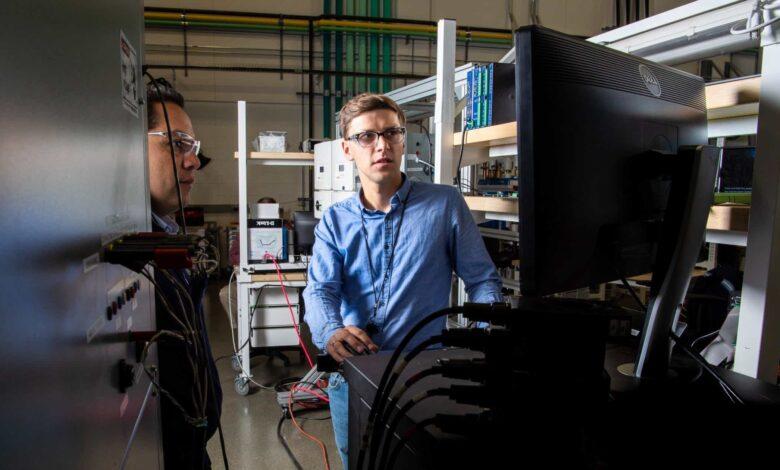
Duties of a Network Engineer
Duties of a Network Engineer: A Network Engineer is a professional who sets up and maintains networks within an organization or between organizations. They help users, staff, clients, or suppliers with their problems. Because of this, they need to be good at figuring out how to fix problems and be able to work with others to solve problems.
Network engineers are in charge of designing, putting in place, monitoring, and managing a company’s local and wide area networks to make sure users have the most uptime possible. In this role, you might design system configurations, write up and manage the installation of a new network, and keep existing systems running and updated as needed. Duties of a Network Engineer
👉 Relocate to Canada Today!
Live, Study and Work in Canada. No Payment is Required! Hurry Now click here to Apply >> Immigrate to CanadaNetwork engineers are in charge of building and keeping computer networks that businesses and organizations use running every day. Most of the time, an intranet, an extranet, a local area network (LAN), and a wide area network (WAN) are all part of these networks (WAN).
A Network Engineer also called a Network Systems Engineer, builds IT networks for businesses. Their job is to use their IT skills to build company networks, work with company leaders to figure out what the networks need, and help employees and other people figure out how to use the networks well.
A network engineer is an IT professional who is in charge of analyzing, designing, installing, configuring, maintaining, and fixing network infrastructure and application components.
Read Also: Duties of a Loan Officer
A network engineer, who is also called a computer network architect, keeps computer networks and computing environments running smoothly and makes sure they are safe. These include hardware programs, software structures, and configurations. Network engineers need to be able to design, plan, set up, and keep an eye on computer networks that support video, data, and voice services over wireless networks. In this role, a person can work with many different kinds of networks. VoIP, which stands for Voice Over Internet Protocol Network, DAN, which stands for Desk Area Network, PEN, which stands for Personal Area Network, WLAN, which stands for Wireless Local Area Network, and LAN, which stands for Local Area Network, are all examples of these.
The job of a network engineer is to set up, maintain, and protect a company’s communication network. They are also in charge of things like setting up email accounts for new employees, giving technical support, and, if necessary, talking with third-party providers. Information Guide Nigeria
Network engineers can work in many different fields, providing IT support and making it easier for coworkers and employees to talk to each other. This job is perfect for people who like working in IT but don’t want to be in charge of a lot of people.
Most of the time, a Network Engineer plans and manages networks to make sure they work the way they should. IT systems can’t work without network engineers.
👉 Relocate to Canada Today!
Live, Study and Work in Canada. No Payment is Required! Hurry Now click here to Apply >> Immigrate to CanadaThe Network Engineer’s job is to make sure that the voice, data, video, and wireless network services inside the company are stable and secure. To do this, the whole organization plans, designs, and builds local area networks (LANs) and wide area networks (WANs). The Network Engineer will also help with setting up, monitoring, maintaining, supporting, and optimizing all hardware, software, and communication links in the network. This person will also analyze and fix hardware and software problems on the network quickly and correctly, as well as train end users.
Computer networks are the job of network engineers. All organizations and businesses, from government departments to the local branches of multinational companies, need these networks to talk to their suppliers, clients, and staff, both inside and outside the organization. Network engineers are the people who put these networks in place, keep them running, and improve them. To do this hard job, they need to know everything there is to know about the hardware and software that make networks work.
Read Also: Duties of a Firefighter

Duties of a Network Engineer
- Install and configure multiple network devices and services (e.g., routers, switches, firewalls, load balancers, VPN, QoS)
- Perform network maintenance and system upgrades, including service packs, patches, and hotfixes.
- Monitor performance and assure the availability and dependability of the system.
- Observe system utilization, trends, and capacity planning
- Provide Level-2/3 help and issue resolution through troubleshooting.
- Work within established configuration and change management procedures to ensure network infrastructure change awareness, approval, and success.
- In collaboration with the organization’s security team, choose and deploy security tools, policies, and processes.
- Communicate with vendors and other IT staff to resolve issues
- Designing and deploying new network solutions or enhancing the performance of existing networks.
- Installing, configuring, and maintaining network hardware such as routers, proxy servers, switches, WAN accelerators, DNS, and DHCP.
- Acquisition of network equipment and management of subcontractors participating in network installation.
- Configuring firewalls, routing, and switching to optimize network security and performance
- Optimizing network performance by means of continuous monitoring and troubleshooting
- Organizing planned upgrades
- Investigating network failures 20 Best Galaxy A10 Cases in Nigeria and their prices
- Updating network equipment firmware to the most recent versions
- Providing status reports to important stakeholders
- Maintaining and administering computer networks and associated computing environments, such as system software, application software, hardware, and configurations.
- When necessary, performing disaster recovery operations and data backups.
- Coordinating, planning, and implementing network security procedures in order to safeguard data, software, and hardware.
- Resolving hardware, software, and other network and system issues through troubleshooting, diagnosis, and resolution.
- When necessary, replace faulty network hardware components.
- Maintaining, configuring, and monitoring anti-virus software and email clients.
- Monitoring network performance to assess whether or not adjustments are required.
- Consultation with network users regarding the resolution of existing system issues.
- Monitoring the performance of networks and computer systems using master consoles.
- Coordinating network access and utilization.
- Networking software, computer hardware, and operating system software are designed, configured, and tested.
- Maintaining computer networks, such as mainframes, VPNs, routers, and other hardware
Read Also: Duties of a Content Manager
- Configuring and installing network equipment
- Developing firewalls and updating anti-virus software and data security technologies to safeguard data and communications
- Monitoring computer systems for the purpose of enhancing network performance for all systems
- Troubleshooting, resolving, and communicating with other employees and management networking difficulties
- Putting into practice catastrophe recovery processes
- Maintaining current knowledge and comprehension of security and networking best practices in order to provide the most effective solutions and protection for enterprise systems.
- Establishes and maintains the performance of the network.
Builds net setups and connections.
Performs network troubleshooting. - IP address verification.
- Establishes networking environment by planning and coordinating system configuration and installation.
- Definition, documentation, and enforcement of system standards.
- Maximizes performance by diagnosing network issues and outages and planning upgrades.
- Configures router.
- Updates data servers and network infrastructure.
- Collaborates with network architects to optimize the network. Good Morning My Love Message
- Establishing and enforcing regulations, as well as defining and monitoring access, to secure a network system.
- Participates in educational opportunities reads professional publications, and participates in professional organizations to maintain job-related expertise. NYSC Portal
- As required, accomplishes information systems and organization objectives by executing relevant tasks.
- Design and implement LANs, WANs, and wireless networks for an organization, including servers, routers, firewalls, load balancers, hubs, switches, and other hardware.
Read Also: Duties of a Front Desk Agent
- Configuration, testing, and maintenance of LAN/WAN equipment and related services
- Determines, diagnoses, and fixes network issues
- Architecting, developing, administering, and maintaining Network, Server, and PC health for customers (as defined by SLA)
- Managing current system settings and implementing new ones, including Windows Server, Virtualization Systems, Mobile Devices, Mobile Platforms, and Desktops (Windows and MAC)
- Provide internal and external customers with Tier 2 and Tier 3 support Romantic Love Message
- Provide official corporate messages regarding changes in direction or modifications that will affect existing services.
- In collaboration with the organization’s security team, choose and deploy security tools, policies, and processes.
- Monitor and maintain all internal and external network security levels.
- Create and maintain exhaustive documentation for all network implementations
- Maintain and manage computer networks, computing environments, software, and hardware settings.
- Diagnose, troubleshoot, and resolve software, hardware, and other network and system issues.
- Design and implement effective ways to enhance the environmental sustainability of contemporary environments. 20 Best Galaxy A10 Cases in Nigeria and their prices
- When necessary, perform disaster recovery procedures and record backups.
- Monitor the overall network performance to determine whether adjustments are required.
- Configure equipment for routing and switching. JAMB Portal
Read Also: Duties of an Interior Designer
We hope that this article will help you to make an informed decision.
Check JAMB RESULT
Check and Confirm: How much is Dollar to Naira







